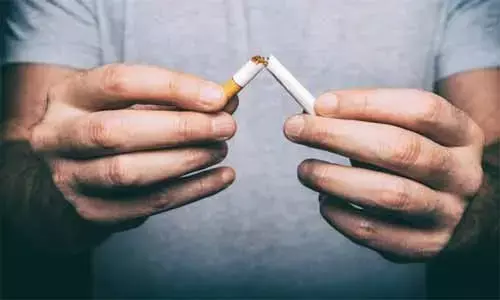- Home
- Medical news & Guidelines
- Anesthesiology
- Cardiology and CTVS
- Critical Care
- Dentistry
- Dermatology
- Diabetes and Endocrinology
- ENT
- Gastroenterology
- Medicine
- Nephrology
- Neurology
- Obstretics-Gynaecology
- Oncology
- Ophthalmology
- Orthopaedics
- Pediatrics-Neonatology
- Psychiatry
- Pulmonology
- Radiology
- Surgery
- Urology
- Laboratory Medicine
- Diet
- Nursing
- Paramedical
- Physiotherapy
- Health news
- Fact Check
- Bone Health Fact Check
- Brain Health Fact Check
- Cancer Related Fact Check
- Child Care Fact Check
- Dental and oral health fact check
- Diabetes and metabolic health fact check
- Diet and Nutrition Fact Check
- Eye and ENT Care Fact Check
- Fitness fact check
- Gut health fact check
- Heart health fact check
- Kidney health fact check
- Medical education fact check
- Men's health fact check
- Respiratory fact check
- Skin and hair care fact check
- Vaccine and Immunization fact check
- Women's health fact check
- AYUSH
- State News
- Andaman and Nicobar Islands
- Andhra Pradesh
- Arunachal Pradesh
- Assam
- Bihar
- Chandigarh
- Chattisgarh
- Dadra and Nagar Haveli
- Daman and Diu
- Delhi
- Goa
- Gujarat
- Haryana
- Himachal Pradesh
- Jammu & Kashmir
- Jharkhand
- Karnataka
- Kerala
- Ladakh
- Lakshadweep
- Madhya Pradesh
- Maharashtra
- Manipur
- Meghalaya
- Mizoram
- Nagaland
- Odisha
- Puducherry
- Punjab
- Rajasthan
- Sikkim
- Tamil Nadu
- Telangana
- Tripura
- Uttar Pradesh
- Uttrakhand
- West Bengal
- Medical Education
- Industry
Smoking cessation heals damaged cells, cuts lung cancer risk

- Despite not being cancerous, more than 9 out of every 10 lung cells in current smokers had up to 10,000 extra genetic changes - mutations - compared with non-smokers, and these mutations were caused directly by the chemicals in tobacco smoke.
- More than a quarter of these damaged cells had at least one cancer-driver mutation, which explains why the risk of lung cancer is so much higher in people who smoke.
- In people who had stopped smoking, there was a sizable group of cells lining the airways that had escaped the genetic damage from their past smoking.
- Genetically, these cells were on par with those from people who had never smoked: they had much less genetic damage from smoking and would have a low risk of developing into cancer.
Ex-smokers had four times more of these healthy cells than people who still smoked - representing up to 40% of the total lung cells in ex-smokers. Dr Kate Gowers, joint first author from UCL, said: "Our study is the first time that scientists have looked in detail at the genetic effects of smoking on individual healthy lung cells. We found that even these healthy lung cells from smokers contained thousands of genetic mutations. These can be thought of as mini time-bombs waiting for the next hit that causes them to progress to cancer. Further research with larger numbers of people is needed to understand how cancer develops from these damaged lung cells." While the study showed that these healthy lung cells could start to repair the lining of the airways in ex-smokers and help protect them against lung cancer, smoking also causes damage deeper in the lung that can lead to emphysema - chronic lung disease. This damage is not reversible, even after stopping smoking.
Dr Kamal Kant Kohli-MBBS, DTCD- a chest specialist with more than 30 years of practice and a flair for writing clinical articles, Dr Kamal Kant Kohli joined Medical Dialogues as a Chief Editor of Medical News. Besides writing articles, as an editor, he proofreads and verifies all the medical content published on Medical Dialogues including those coming from journals, studies,medical conferences,guidelines etc. Email: drkohli@medicaldialogues.in. Contact no. 011-43720751


